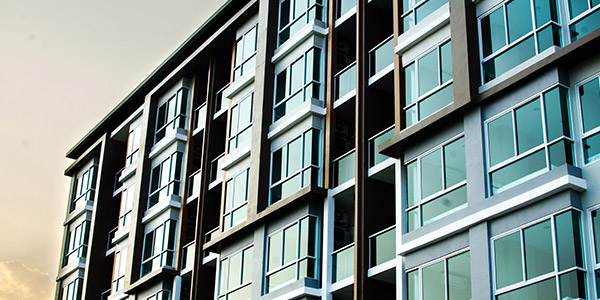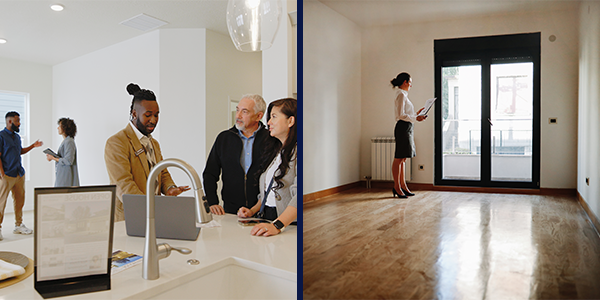Homebuyers
Condo vs. Apartment: Which Is Better for You?
February 17, 2022
Are you conflicted between buying a condo or renting an apartment? Choosing one over the other presents a very different type of lifestyle, and it may be difficult to even know what the difference is between a condo and an apartment. So, which is better for your living situation? Let us take a look at the differences to help you figure out which works better for you: a condo or an apartment.
Let's start with the first and most important question.
Is an apartment and a condominium the same thing?
No, they are not the same. However, they do have some similarities. For example, neither is typically a standalone building, like a single-family home. Instead, both are usually located in buildings with other units and often have common areas that are shared by other residents.
The biggest difference between the two is that you rent an apartment and buy a condominium.
What makes a condo a condo?
A condo, also known as a condominium, is a private residence purchased by an individual homeowner or family in a building or community with several units. Although condos are usually part of a larger building, detached condos also exist. They can vary in size or style and often share walls with adjoining units.
Residents own and can maintain the interior of their condo unit, which means you can do what you want with any home improvements that may be needed!
What is an apartment?
An apartment is a rental property that is normally owned by a property management company, located in a residential building, complex, or community. In an apartment building or complex, all units are similar, the owner is the same, and all the occupants follow the same protocols and rules for renting the units.
When living in an apartment, keep in mind that you can only rent, and you won't be able to make any home improvements whenever you want, like you can with owning a condo.
Now that we've laid out some of the basic differences between a condo and an apartment, let's take a deeper dive into what makes each one unique.
Building equity
When you buy a condo, you could potentially build equity over time. As you pay more money into the property, you are building equity in that property.
Home equity is the portion of the home that a person truly owns. It can increase over time if the property value increases or the mortgage balance is paid down. Home equity is often a homeowner's most valuable asset.
It can be used later in life, so it's important to understand how it works. If the condo you're purchasing is your first home, you may be able to build equity that can be used as a down payment on your next home. Even if it's not your first home, you could still be building equity that you can use towards the purchase of your next home. Additionally, you could sell the condo at some point in the future and turn that equity into cash in your pocket.
When renting, you're paying your landlord and aren't able to build equity.
Costs and maintenance
Is a condo more costly than an apartment? A condo may not cost you more than renting an apartment. If a condo and an apartment are in the same part of town, with similar square footage, chances are their monthly costs may be around the same. The upfront costs to purchase may be higher than a rental situation, but any repairs needed in an apartment will not be the tenant's responsibility. However, when you own a condo, you can customize the home however you like and truly make it yours.
With a condo, you're responsible for the maintenance of the unit versus having a property management company in charge of any maintenance. Condos probably have a Homeowners Association (HOA), which is likely responsible for maintaining the common areas, shared amenities, and the building itself. But the HOA won't fix a leaky sink. That will be your responsibility, which puts you in control of your costs.
If you are renting an apartment, the complex offers maintenance and you are not responsible for the repairs.
Upfront costs
It should be noted that when you buy a condo, a down payment will likely be required, which means you'll have to save up first. When renting an apartment, there is no down payment. While there may be a security deposit or other upfront costs, they are likely lower than buying.
Rules for a condo vs. apartment
The rules for condo buildings and apartment complexes are likely different as each set of rules is unique to that particular property.
The rules for each are determined by the owner. For an apartment, the property management company implements the rules, which apply to all units. The property management company also chooses when the interior of the units gets remodeled.
The rules for a condo are set by the HOA. However, those rules dictate what happens to the outside areas of the units. The interior of your condo, however, can be remodeled when you would like since you're the owner. When buying a condo, you will likely be required to pay fees to the HOA, which help pay for the upkeep of common areas and building exteriors.
Is a condo better than an apartment?
It depends on what you are looking for. Both options have some similarities in that each likely offers a good location, and desirable amenities, and don't require the kind of upkeep that a house with a yard would necessitate.
However, with a condo, each mortgage payment moves you closer to owning the property outright. Beyond that, you are also building equity with each monthly payment, which will help you down the road should you choose to sell.
Additionally, many people believe that renting is cheaper than buying, but that's not always the case. When you rent, there is a chance that your landlord could increase your rent every year. When buying a condo, your payment of principal and interest is locked in should you get a fixed-rate mortgage. Your property taxes may increase.
Plus, you can make a condo your own. Do you like keeping up with the latest design trends or having an updated kitchen or bathroom? A condo may be the right choice for you, so you can decorate the way you want.
With that, let's take one last look at the difference between owning a condo and renting an apartment:
|
|
Condo |
Apartment |
|
Affordability |
Condos tend to be less expensive than single-family homes and can be cheaper than renting in many cases |
Depending on the market in your area and the amenities of the complex, apartments can be a very cost-effective option as you build toward saving or a down payment. |
|
Building equity |
When buying a condo, you can build equity which can help establish your financial future |
With renting, you are paying a landlord, so there is no opportunity to build equity |
|
Upfront costs
|
Buying a condo will likely require a down payment, which will likely exceed the security deposit for an apartment |
Apartments likely require an upfront security deposit. Some apartments may also require you to provide first and last month's rent before moving in |
|
Maintenance
|
With a condo, you are responsible for maintaining your unit and can control the cost of upkeep. If something breaks, you will need to deal with it (or hire someone to deal with it) |
If something breaks in an apartment, the landlord or property management company is responsible for fixing it |
|
Amenities |
Many condo buildings have common areas that you can use, including tennis courts, a gym, and more |
Many apartment complexes also offer common areas that are shared by all residents, including a pool, a theater room, and more |
|
Rules |
In a condo, the HOA dictates what happens outside of the units. Inside the unit, however, is usually your choice |
With an apartment, the landlord will likely have rules about what you can do both inside and outside of your apartment |
|
Improvements |
In a condo, you can make whatever improvements or upgrades you want to your unit |
With an apartment, your landlord will ultimately decide on any improvements |
|
Flexibility |
When buying a condo, that's your home for some time. You are likely in control of when and if you ever move out of the condo |
Apartments offer more freedom to move than a condo because you have no ownership of the property. If you want to move to a new apartment or a new city, you can as soon as your current lease is up |
Knowing your preferences and needs can help you find the right option when it comes to owning a condo and help you on the way to achieving your dream of homeownership.






 Smart Moves Start Here.
Smart Moves Start Here.